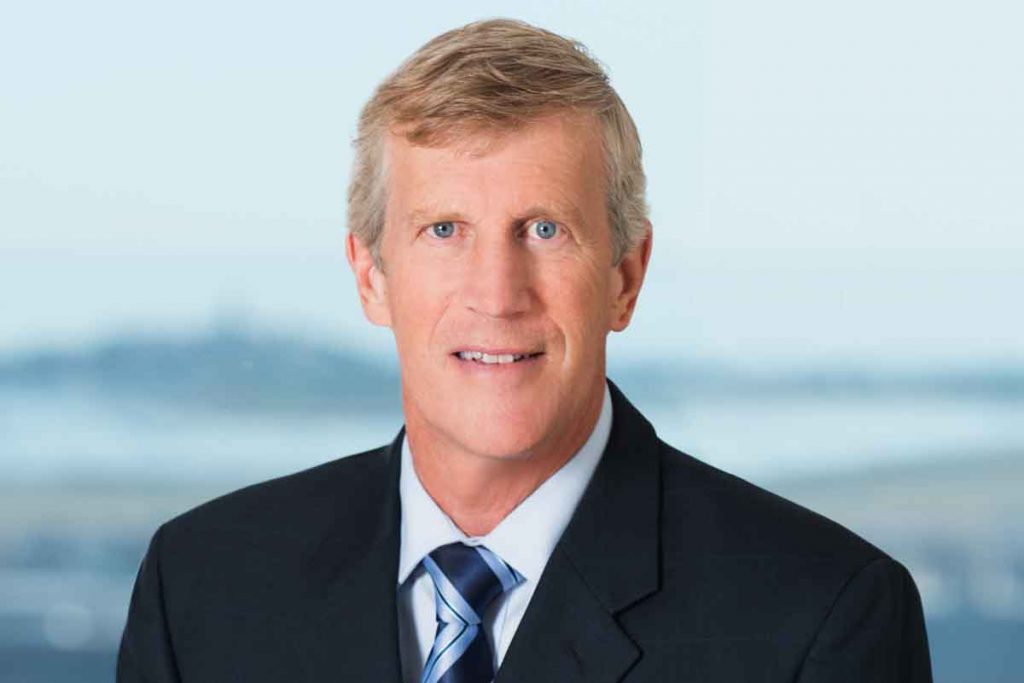Former Supreme Judicial Court Associate Justice Robert J. Cordy has been named the Rappaport Distinguished Visiting Professor at Boston College Law School for the fall semester. A sought-after proponent of the rule of law, he has had a distinguished career in state and federal service and in the international community assisting countries that wish to establish stronger constitutional democracies and judicial systems. Some of that work has been in cooperation with the Law School.
“Justice Cordy has a long association with BC Law through his work with some of our global initiatives, our Graduate Legal Education and International Programs under Susan Simone Kang, and our moot court competitions. We feel very fortunate to be able to welcome him in this official capacity,” said Dean Vincent Rougeau. “He will greatly enrich our programs on international law and policy.” Rougeau also noted that Justice Cordy is the second consecutive judge from the Massachusetts Supreme Judicial Court to become a Rappaport professor at Boston College Law School; he follows Geraldine Hines, who taught last spring.
Lissy Medvedow, executive director of the Rappaport Center for Law and Public Policy, said that Justice Cordy, who plans to teach a seminar called Constitutional Democracy Under Siege, brings to the Law School a timely perspective on national and international policy issues. “The rule of law is in jeopardy in the US,” she said. “Justice Cordy’s work provides a unique outlook on how the rule of law can serve democracies, and on how, in its absence, society and humanity suffer.”
Justice Cordy began his career at the Massachusetts Public Defenders Office and subsequently served in the Massachusetts Department of Revenue and the Massachusetts State Ethics Commission. He then served as a federal prosecutor in the US Attorney’s Office for the District of Massachusetts, where he became Chief of the Public Corruption Unit. From there, Justice Cordy went to the private sector, working at Burns & Levinson after which he returned to public service for the Commonwealth when named Chief Legal Counsel by then-Governor William Weld. Following his state service, Justice Cordy joined McDermott, Will & Emery.
Appointed to the Supreme Judicial Court in 2001, Justice Cordy remained there until his retirement in 2016. He rejoined McDermott, Will & Emery where he focuses his practice on white collar criminal defense, internal investigations, appellate work, and significant public/private development projects.
Throughout his judicial tenure to the present, the Dartmouth College and Harvard Law School graduate has been traveling the world to help bring the rule of law and democracy to foreign countries, including Russia, Turkey, and Uzbekistan.
Kevin Curtin ’88, senior appellate counsel and grand jury director at the Middlesex District Attorney’s Office, has traveled and collaborated with Justice Cordy since 2013. Both are members of the Advisory Council for Regional Dialogue, a Slovenian based-NGO focused on capacity building in criminal justice systems, advising governments developing systems for legal and judicial training, promoting international dialogue on issues of law reform, and enhancing governmental support for human rights. They’ve worked together on five training programs in Tashkent, Uzbekistan, and are currently focusing on proposed revisions to the Uzbek criminal procedural code.
Curtin is impressed by Justice Cordy’s effectiveness. “He has achieved astonishing, historically significant, successes in countries seeking to embrace progressive change,” he said. “In countries laboring under increasing authoritarian rule (whose number alas today is growing), his message remains an alternative light of hope.”
Curtin has also observed Justice Cordy’s gift for inspiring others. “His fearless battle against autocratic despotism, and in support of ordered liberty under law, already has attracted to him a large team of American judges and lawyers, eager to join the fray,” Curtin explained. “He sends these foot soldiers forth in squadrons, even to the ends of the earth, seeking to light the world. Now, as the Rappaport Distinguished Visiting Professor, we can look forward to Justice Cordy inspiring our students likewise, even as Ignatius once exhorted his charges, to ‘go forth and set the world afire.’”
Another BC Law-Cordy connection is the relationship that Regional Dialogue facilitated between Tashkent State University of Law (TSUL) in Uzbekitstan and Boston College Law School, which recently signed a Memorandum of Understanding. Professor Joan Blum, who has conducted two week-long faculty development programs there, views Justice Cordy’s role as pivotal in forging such alliances. “His dynamic engagement with Regional Dialogue catalyzed the ongoing collaboration between BC Law and justice sector institutions in Uzbekistan,” she said.
For his part, Justice Cordy sees the Rappaport professorship as an opportunity to combine his experience in the executive branch under Governor Weld, in the judiciary, and in the international community to educate a new generation of lawyers. “I’d like to bring these things together, raise issues, and have coherent discussions about the critical elements needed to build and sustain strong constitutional democracies that can meet the challenges of corruption, autocracy, and threats to free speech,” he said.
Justice Cordy will kick off his term with a public address, “Challenges to Constitutional Democracy,” on September 5 at 4 p.m.


